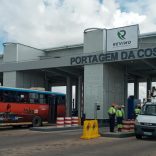Mozambique: REVIMO net profit reached 54.7 million meticais in 2024
Soares da Costa sale of assets in Mozambique still pending on court decision

RTP (File photo)
Workers at Soares da Costa, whose viability plan has been approved by creditors, will receive almost all arrears 45 days after approval of the recovery plan which favours Angola over Mozambique.
According to the recovery plan presented by the construction company’s management – which, according to the ‘Publico’ newspaper yesterday, was approved by a slim margin with just 51.08 percent of the votes – pay owing to workers will be “the amount corresponding to one month to be repaid” in five successive and fixed annual instalments, each in the amount of 20 percent of the initial balance, the first due 45 days after the approval of the plan, and with “full pardon of interest due and accrued”.
As regards the amounts related to compensation for termination or revocation of employment contracts, they will also be repaid “in five consecutive annual installments (each in the amount of 20 percent of the initial balance), within the first 45 days after the date of approval of the recovery plan”, and also with “total forgiveness” of interest.
Público wrote yesterday that the creditors’ vote, representing 98 percent of those eligible, would – if approved by the courts, which have ten days to deliver a ruling – facilitate the company’ s recovery.
According to the newspaper, “the main creditor, the Caixa Geral de Depósitos group (CGD), holding close to 30 percent of the debt, voted against the proposal presented by the company’s management”, but “mobilization of suppliers and workers allowed the company’s viability”.
Credits claimed against the construction company exceeded EUR 1.4 billion in total, but the receiver recognized only about EUR700 million euros, EUR 179 million of which was owing to CGD.
Contacted by the agency Lusa, an official source at Soares da Costa said that the company “was happy with the clear approval of the feasibility plan presented”, and was convinced that “it is possible to enable a centennial brand that has a great impact on the economy and job creation”, but said further comments would have to wait until the court ruling and the completion of the revitalization plans of two other companies in the group.
CGD’s official source, also contacted by Lusa, said it had no comment to make.
From a reading of the recovery plan, however, it is evident that the operational restructuring of the construction company will focus on Angola, “in view of the prospect of growth of the economy in that latitude” and the sale of business in Mozambique (currently responsible for 29 percent of the company’s activity) and of CGD’s 4 percent interest in Portugal’s Auto-Estradas XXI – Transmontana Subconcessionária and companies involved in Transmontana motorway.
Under the “Angola focus” (currently responsible for 55 percent of the company’s business), the plan provides for “back office” services to be transferred there, leaving in Portugal only those services whose transfer proves “impracticable” such as “technical direction, budgets and proposals and systems”.
However, management admits, “operational restructuring and the disposal of assets do not allow the release of sufficient cash flows to meet the current volume of debt”, so a financial restructuring based on an immediate financing line of EUR 45 million and a line of bank guarantees has meanwhile been secured.
“These two lines of financing ensure the financing of the company’s activity and, together with the business plan [foreseen in the plan], ensure the future viability of the company,” Soares da Costa says.
Regarding the repayment of debts, the largest part of debt forgiveness will fall upon the banking sector, which has been asked for a 60 percent forgiveness of credits in euros or dollars and 20 percent of debts contracted in Angolan or Mozambican currency, the remainder being repaid over 18 years.
Debts to suppliers are to be paid off over five years – in full for creditors with debt in kwanzas or meticais or who accept the conversion of debt to kwanzas, or at 50 percent for creditors who wish to convert or keep debt in euros or dollars.
In the case of banks with debt secured by mortgages on real estate, Soares da Costa has the option, within 30 months from the date of final ‘res judicata’ of the approval of the plan, to make the full payment of the debt or transfer real estate collateral assets given as guarantee
in lieu of payment.
These assets include several plots in the Porto neighbourhood of Campanhã and in Angola, apartments in Funchal and Luanda and shipyards in Portugal and Angola.
Soares da Costa’s main shareholder (with 66.7 percent of capital) is GAM, owned by Angolan businessman António Mosquito, and in 2014 was separated from Manuel Fino’s SDC Investimentos, owner of 33.33 percent of the capital.













Leave a Reply
Be the First to Comment!
You must be logged in to post a comment.
You must be logged in to post a comment.